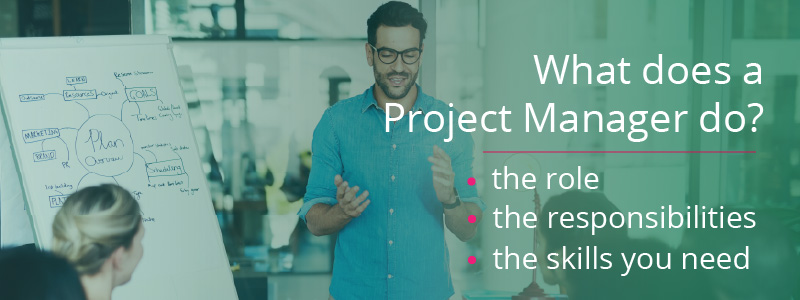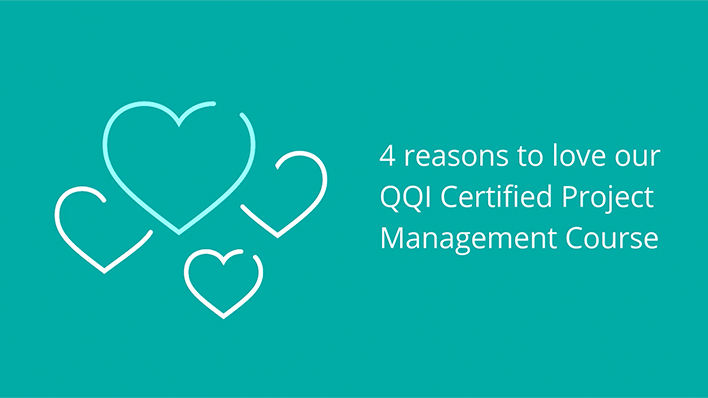What does a Project Manager do?
If you’re thinking about becoming a project manager or are informally managing projects, it’s very helpful to look at what a project manager does, both on a daily basis and throughout the life cycle of a project.
This short article looks at the key responsibilities of a project manager. We also focus on 12 essential skills needed by all successful project managers.
Answered In This Article:
Get an Instant Overview
You can get access to information about our
Project Management courses by instantly downloading our PDF brochure, "A Guide to our Project Management Courses and Certifications".
What is a project manager?
A project manager is someone who takes responsibility for planning and guiding a project from idea to achievement.
Sometimes, they work actively on the project deliverables, but they are always involved in scoping out what needs to be done, and then tracking the progress of the project.
As you’ll see below, the role of a project manager encompasses many different responsibilities and requires a versatile set of skills.
What does a project manager do?
A project manager may work on different facets within a project, depending on its scale and requirements. However, you'll find that no matter what else takes place during a project, the project manager will always cover the following 5 responsibilities.
-
Project Planning
Once a project has been initiated, the project manager plans the project.
They look at the goals or deliverables required and, using specific tools and techniques, plan out what is needed to get there.
Manages the Team
In every project, you will have a project team, those who will create the project’s results. This can vary from a very small team, to a large, cross-functional team.
The project manager will mentor the team, keeping them motivated and productive throughout the project’s life cycle. They help to eliminate roadblocks to productivity and troubleshoot any other issues that can pop up.
-
Engages with Stakeholders
Effective stakeholder management is a crucial part of running any project.
Stakeholders are anyone that has an interest in the progress and results of your project. This can include customers, leadership team, colleagues on other teams in your organisation, and the project team members themselves.
The project manager will communicate regularly with all stakeholders to provide progress updates, manage expectations, and handle any changes to requirements.
-
Co-ordinates the Project
There can be many moving parts in any project, even those which appear straightforward at the outset.
Co-ordinating these elements successfully falls to the project manager. It is a key benefit of having a project manager on your team.
The project manager keeps everything on track, preventing any task falling through the cracks.
-
Maintains Momentum
Keeping the forward momentum moving on a project is very important. It’s very easy for enthusiasm to wane once a project nears the end of its lifecycle, or hits a speedbump.
A good project manager will ensure that progress continues steadily throughout the project.
12 Essential Skills Every Project Manager Needs
1. Communication
We have listed this first, as it’s connected to almost every other skill required by a project manager.
Projects move quickly and the project manager must communicate clearly with all involved at each stage to avoid confusion and encourage productivity.
2. Collaboration
Great project managers remain open to the ideas and contributions of those within the project team.
This creates a clear path for creating the best solutions within a project.
3. People management
Managing the project team is a large part of the project manager role.
People management is an umbrella with many other skills beneath it such as motivation, conflict resolution, assertiveness and performance management.
4. Time management
With so many different elements on their schedule, a project manager must have the ability to manage their time wisely.
Efficient time management and delegation skills are part of any skilled project manager's repertoire.
5. Problem solving
It’s almost unheard of for a project to run smoothly from start to finish. Obstacles appear and sometimes things just don’t work.
In these moments, a project manager steps in to solve the problem so that work can continue.
6. Organisation
Right from the initial planning stage, project managers need to be organised.
There is so much happening with so many moving parts to a project. The project manager is depended upon to keep track of everything. Strong organisational skills are a must.
7. Motivation
As a project manager, you need to keep your team motivated and productive throughout the project cycle.
This begins with you and your enthusiasm for the project.
8. Stakeholder management
Informed stakeholders are, for the most part, happy stakeholders.
Learning how to engage positively with your project stakeholders to create strong, productive relationships is a key skill.
9. Risk management
Being able to identify and plan contingencies for potential risks protects both your project, and the business as a whole.
10. Meetings
As project manager, you will need to know how to run efficient, successful meetings.
This skill links in with stakeholder management, organisation and time management.
11. Change Management
These days, project requirements are subject to change more than ever.
Responding to change and coaching the project team through change is becoming increasingly important for every project manager.
12. Budget planning and management
Project managers include resource management as part of the planning stage.
You will need to understand how to set out a clear budget plan and manage it as the project progresses.
4 Strategies for Becoming a Good Project Manager
If you’re wondering how you can get these skills in order to be the best project manager you can be, we’ve got 4 solid strategies to put into action.
1. Training for skills and confidence
Build a strong foundation in project management skills by attending training. You can read more about choosing the right course for your career by reading our article: What is the Best Project Management Course?.-
2. Put it into practice
Once you have gained knowledge and skill through training, the very best way to solidify and develop those skills is to actively apply them to live projects.
Keep working on projects to really get into your stride!
3. Self-evaluation, always
At the end of a project (and during a project if you have time!) it’s hugely beneficial to look at what went right and what could be improved.
Taking time to do this and bringing the learning into your next project will ensure that you grow your skills continuously.4. Never stop learning
Continuing in this vein, it’s important to note that the very best project managers never, ever stop learning.
Tap into online resources such as project management blogs and seminars. Schedule self-evaluation into your project timeline. Attend further training to progress your knowledge and expand your skill-set.
Following through on these 4 steps and
remaining interested and engaged in your work will firmly establish you as a project manager of the highest calibre.
Up to 25% Off Virtual Project Management Training
We’re currently offering up to 25% off all Live Virtual Project Management Training*.
Reserve your place our an upcoming Project Management Courses and begin expanding your skills from home.
*discount cannot be combined with any other voucher or offer.




















